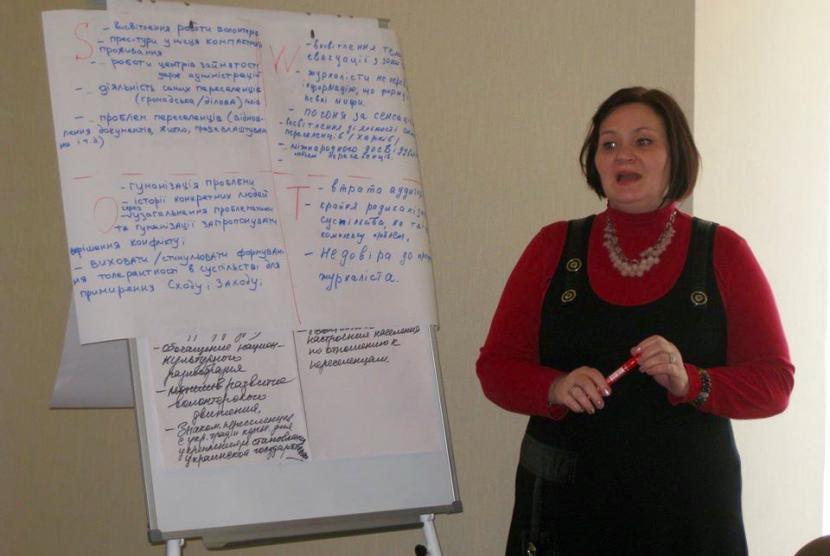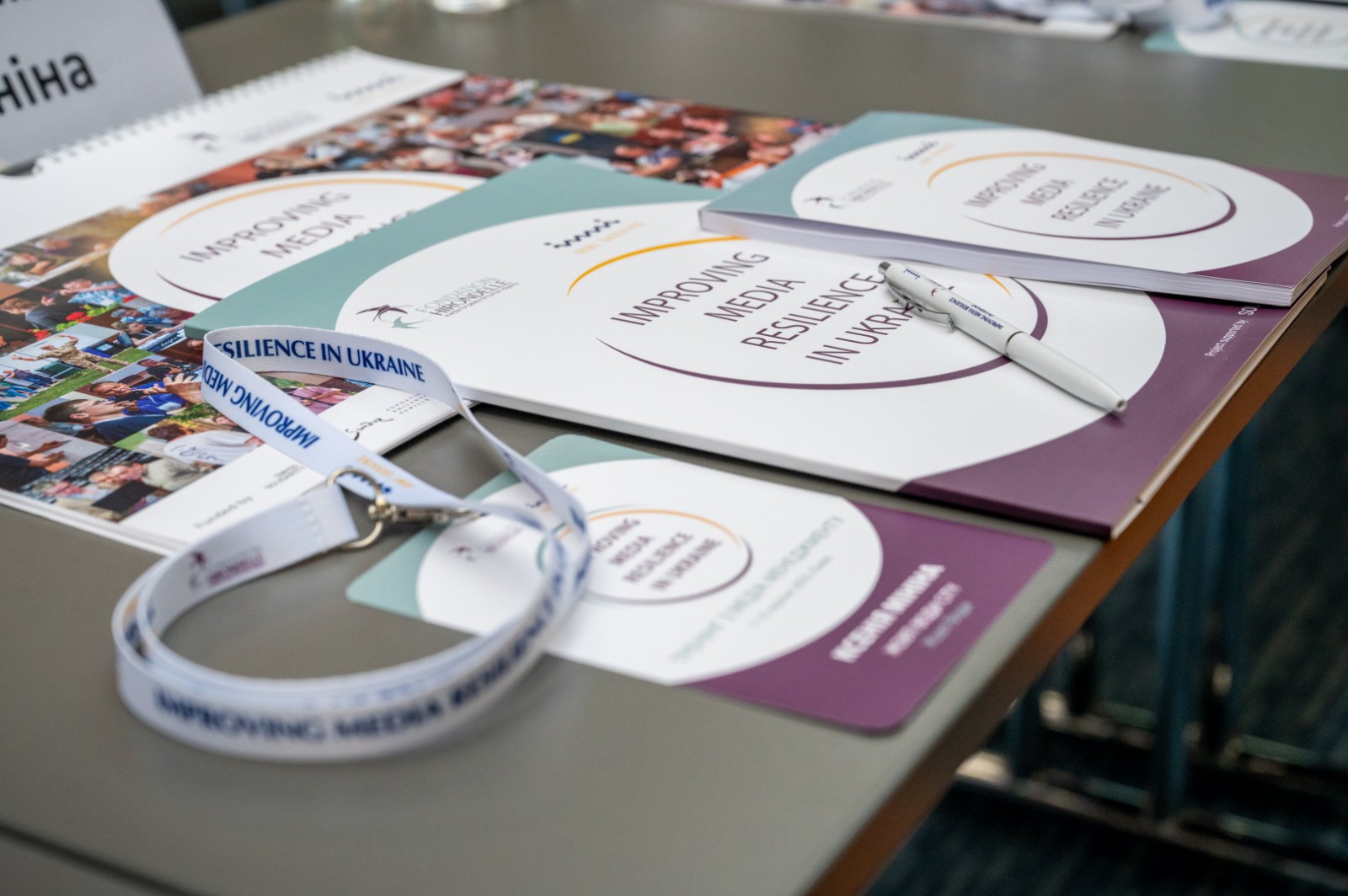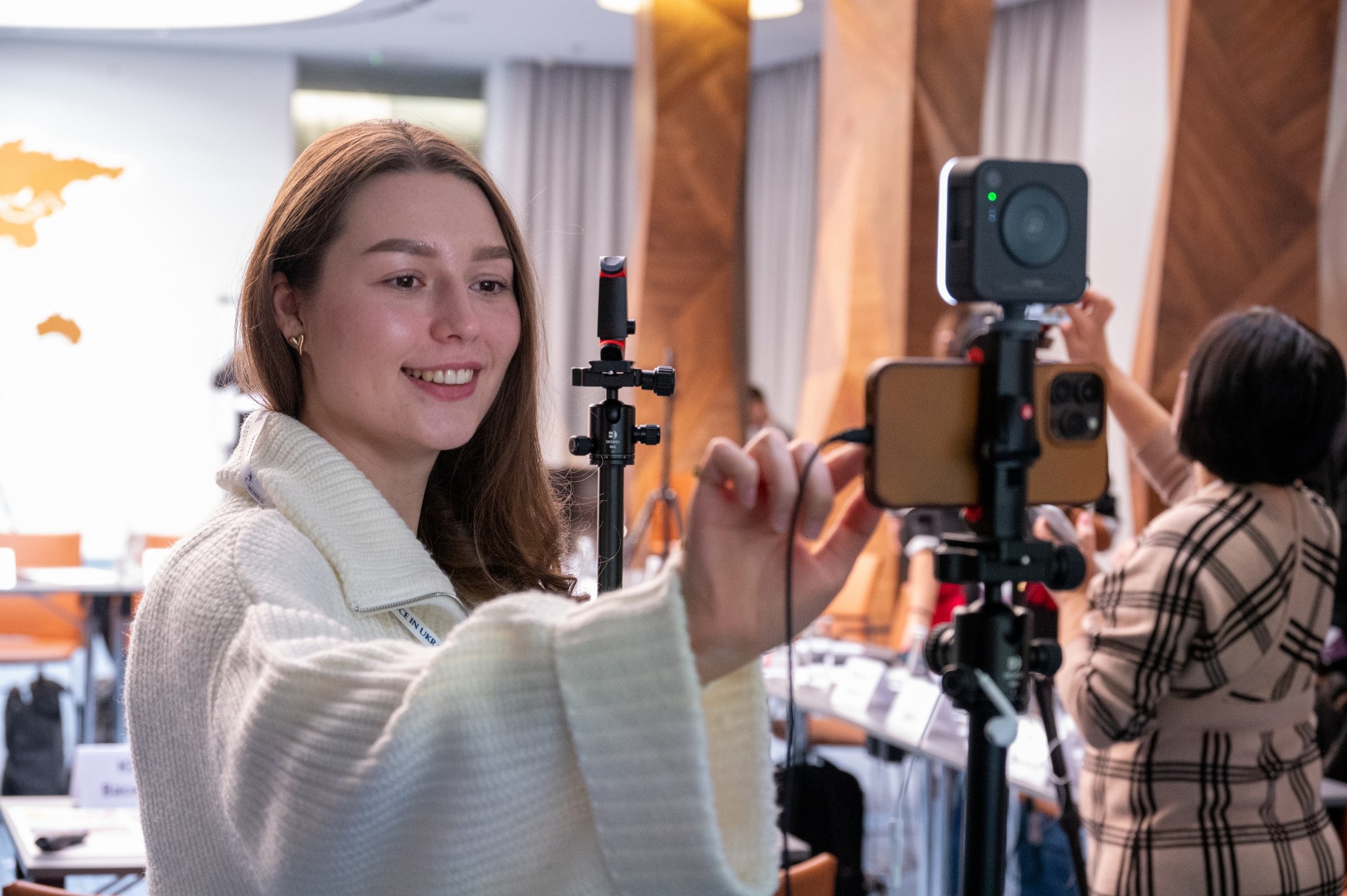Reporters from Lviv, Poltava, Chernivtsi, Pavlograd, Zaporizhia and Kharkiv gathered in the East of Ukraine to discuss professional approaches to IDP coverage. Institute of Regional Media and Information (IRMI), Thomson Foundation (UK) and Journalists’ Initiative Association (Ukraine) extended training within the project titled “A programme to support conflict sensitive media reporting in Ukraine’s regions.”
The project is supported by the British Embassy in Ukraine.
A two-day workshop titled “Media coverage of IDP issues: professional and ethical standards” in Dnipropetrovsk gathered theme-related professionals – journalists and representatives of volunteer organizations that work with IDPs on a daily basis and are deeply immersed in the problems of those people. Training experts were Yelena Barannik of IRMI, a journalist, author and presenter of television projects and Mark Webster, a TV reporter, who covered conflicts in Africa, the Middle East, Kosovo, Chechnya and Panama. The trainers managed to integrate different points of view of the participants and build bridges between social issues and the issues that the media are facing these days.
Irina Bulysheva of Domomoha Dnipra says: “some journalists say there is media fatigue with the topic. There is also fatigue in the society. Many journalists have become volunteers and help the army, having “shut out” for themselves an extremely difficult social issue of IDPs. Other journalists adhere to a very formal side of the issue with their accounts of official visits or statistics. Very few people would give a thought to the fact that a humanitarian crisis in our society is kept back only with the efforts of the community, not the state. Journalists must keep setting out the evidence to the fact that the IDPs of today are part of our lives, they are still in the process of integration into new communities, IDPs are not a burden, but our citizens and a social resource. Their problems are our problems. No one covers IDP-related issues systematically, the theme does not seem to be as cool as, say, military assistance. I can understand that – a journalist is a human being just like anyone else, with their emotions, influenced by public negativism and generally critical attitude towards IDPs. I wish that journalists would work honestly, impartially, telling about people and their stories as well as opportunities out there. Therefore, it is essential to discuss IDP issues with the media, raising awareness of all those involved, uniting our efforts. In this sense, the training that took place, I think, is very timely.”
The trainees that gathered in Dnipropetrovsk were active and showed engaged. There were enough commentaries, practical tasks and discussions with colleagues and trainers. Guest speakers’ presentations were timely and topical. During mock press conferences a Q&A session took place. The volunteers showed openness towards the media and willingness to draw attention to IDP-related issues.
Yuliya Shlepakova, a psychologist working with adults in the Dnipropetrovsk psychological crisis service said: “People need to see more accounts that are positive, success stories of IDPs coping well with new circumstances and becoming part of a new life. Do not make them more helpless thah they actually are, you should inspire their faith – above all their faith in themselves. This I see as one of the tasks of journalists.”
What was important for the trainees? It goes without saying that they needed to analyze the issues, on hearing other points of view and finding out about what the situation is like in other regions. They also wanted to establish new contacts and glean new story ideas.
Nataliya Sirobab of a poltavian newspaper titled Kolo said: “It was important to find out about international approaches to IDP coverage, socialize with colleagues and hear about their professional practices and focus. Generally to step aside and and look at the work of our newsroom from a different angle.”
Oksana Necheporenko, TV reporter, ATN, Kharkov: “I have somewhat changed my view as to IDPs, my attitude towards them – thanks to the trainers and guest speakers. Sometimes it is very difficult to take a balanced approach, especially when the topic leaves certain personal impact. I always try to keep track of how my colleagues work (though basically I know what to expect from a particular reporter). I analyze and assess. In our media organization we strive for even-handed coverage, giving voice to all parties. Unfortunately, not all the media take similar approach.”
According to Yelena Barannik, the expert of the training thainks that when working with IDP-related issues a journalist needs to show tremendous self-composure, sensitivity and professionalism. When information war is underway it is a very challenging task for any journalist to achieve balance, adhere to norms and seek reliable information. IDP issues are a long-term topic and only acting that way one may draw attention of community and authorities for those issues to be addressed. Integrating people who lost their homes and work into a peaceful life.
British expert Mark Webster adds: “the profession that gives access to many sources of information but requires great responsibility today was represented by people who are caring, honest and dignified.”








